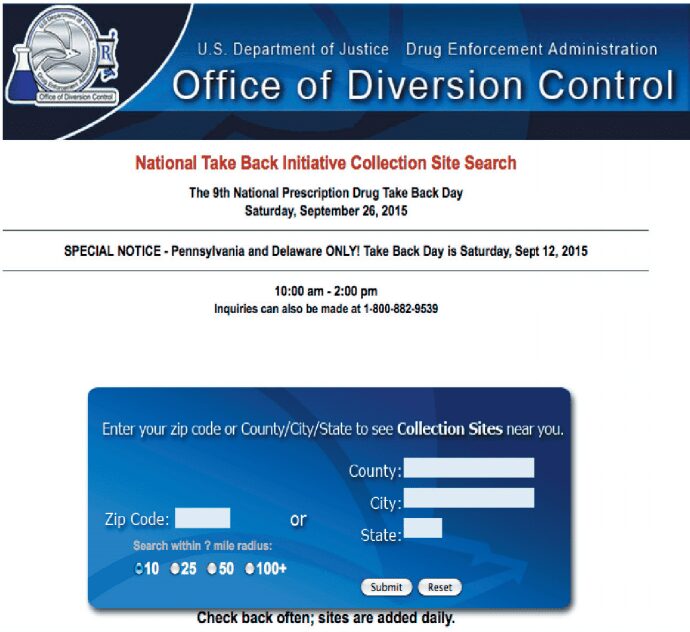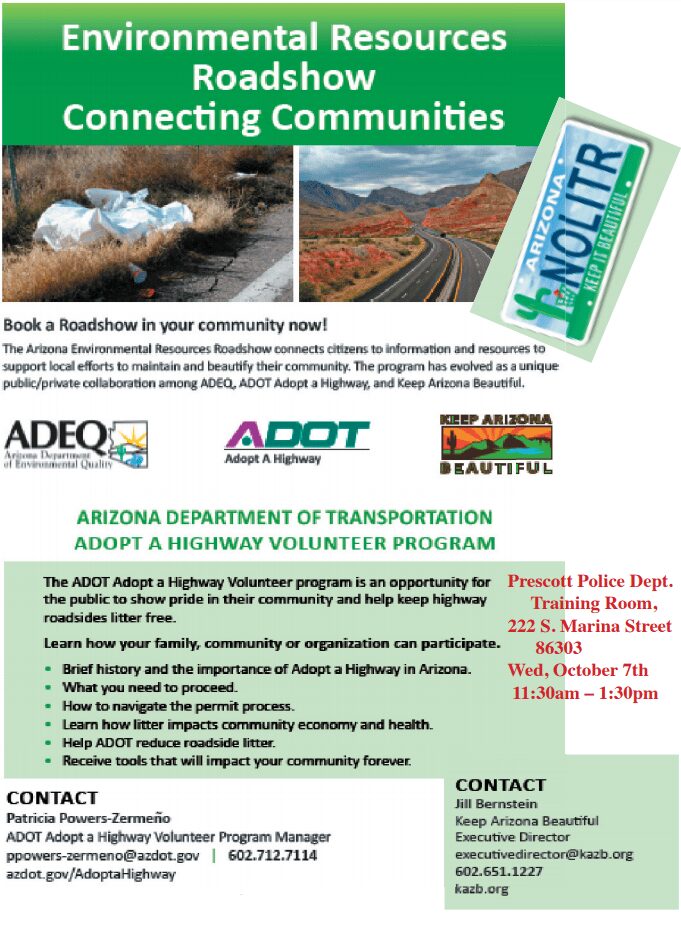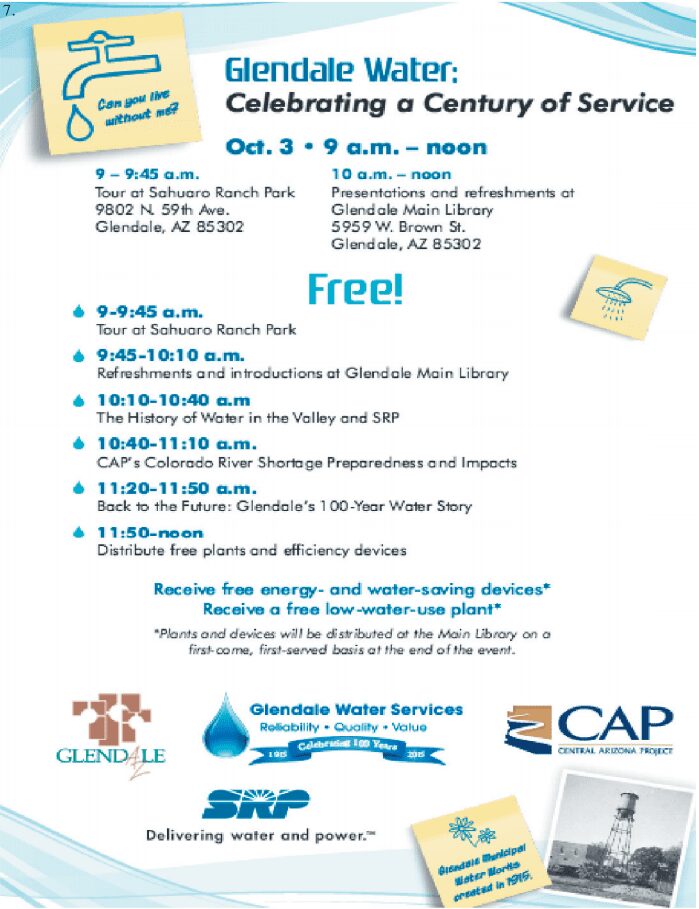1. ADEQ Invites You To Join In Celebrating Pollution Prevention (P2) week. ADEQ will be celebrating Pollution Prevention (P2) week (September 21-27) by hosting two free educational webinars. Join us to learn how facilities in Arizona have been successfully implementing P2.

Tues., Sept. 22, 2015 from 10 a.m. to 11:30 a.m. MST
P2 Webinar Registration URL: https://attendee.gotowebinar.com/register/5057893494500977410
Presenters: Praxair Electronics Kingman, Luke Air Force Base and Freescale Semiconductor
Topics: reducing electrical consumption and hazardous waste, groundwater ‘pump and treat’ alternatives, recycling, and conserving water
Wed., Sept. 23, 2015 from 2 p.m. to 3:30 p.m. MST
Webinar Registration URL: https://attendee.gotowebinar.com/register/1899572732032862209
Presenters: Frito Lay, Arizona State University and Corning Gilbert
Topics: clean transportation, water reuse, alternative energy, organic fertilizers, recycling, and waste reduction
Be a part of something great!! Participate!
2. Tri-State Seminar.
Upcoming Seminar Dates
September 22-24, 2015 – September 20-22, 2016
September 26-28, 2017 September 25-27, 2018
The Tri-State Training Council and I would like to welcome you to the 2015 Tri-State Seminar being held September 22nd through the 24th at the South Point Hotel / Conference Center.

By the comments the Tri-State Training Council has received moving the Tristate Seminar to South Point Hotel / Conference Center moving the Tristate Seminar to South Point Hotel / Conference Center has been a win win for all those involved. This year’s Seminar will hold many new and exciting things for all Attendees, Exhibitors and hold many new and exciting things for all Attendees, Exhibitors and your family members.
Take a look at the great program and special tours we have available at http://www.tristateseminar.com/ at the South Point Hotel / Conference Center, South Point • Las Vegas Hotel. Casino Spa located at 9777 Las Vegas Blvd. South, Las Vegas, NV 89183. Call 702-796-7111 or 1-866-796-7111.
3. CAP, Partners And a Wet Spring Stave Off River Shortage. CAP, partners and a wet spring stave off river shortage The U.S. Bureau of Reclamation recently released a report confirming that the U.S. Secretary of the Interior will not declare an anticipated shortage of water on the Colorado River in January, 2016. Record breaking rains and cooler weather in the Upper Colorado River Basin in May and June were a welcome relief to avoiding a shortage, but the extraordinary planning, partnerships and conservation employed by the Central Arizona Project (CAP) played a critical role.
More than a trillion gallons of Colorado River water has been stored underground in central Arizona by CAP and the Arizona Water Banking Authority. This enormous amount of water – enough to fill Yankee Stadium more than 500 times – has been intentionally stored to provide back-up supplies for cities, industries and tribal lands in times of shortages on the Colorado River.
Along with storing water underground, CAP has created close working relationships with the Colorado River Basin states, the federal government, Mexico and local and regional partners to conserve Colorado River water and to improve the health of the river to reduce the chances of a shortage. This cooperation is a shared sacrifice to safeguard long-term reliability of the Colorado River system for everyone.
Anticipating a shortage, CAP and the Arizona Department of Water Resources began a partnership last year with the U.S. Bureau of Reclamation, California, Nevada and municipal water agencies as a first step to protect Colorado River water by storing an additional 740 thousand acre-feet of new water in Lake Mead. CAP’s goal to store 345,000 acre-feet of water in Lake Mead between 2014 and 2017 would add approximately four feet of water elevation in Lake Mead. So far, CAP is about one-half of the way to our goal. The combined benefit of the water left in Lake Mead by the interstate partners involved is critical in our efforts to avert a potential shortage in 2017.
4. Manure Sharing Program Launched On Watershed Website. The Oak Creek Watershed Council offers a free online module to all Arizona residents to “share” their excess manure with the community Sharing in the state of Arizona just got a little easier, for manure anyway. The Oak Creek Watershed Council launched its free web-based Manure Share Program on September 14. The online module allows any resident of Arizona the opportunity to share or find free manure across the state. Participants may choose from a multitude of manure types, including cow, horse, chicken, llama and duck to name a few. The site includes proper composting techniques for livestock manure, a helpful glossary of terms for the novice, and a great community hub to share a viable resource – free fertilizer!
“We are really excited about the possibilities this program can offer to the Oak Creek Watershed and the surrounding Arizona communities,” said Executive Director Marie McCormick, “mobilizing the state into responsible action takes time and dedication – and we hope that this program will make a positive contribution to the reduction of E. coli bacteria in our waterways.”
The Manure Share web service brings people searching for organic materials for use in field applications together with livestock owners who have excess manure. This ultimately benefits the water quality in Oak Creek and across Arizona by safely removing excess nutrients from the land and effectively lowering the amount of commercial fertilizer needed by gardeners and landscapers.
“If each household has a material that is regularly disposed of, and, instead, it’s given to an interested party, that pollution just became a solution” stated Ryan Matson, OCWC Board member and Technical Manager for the Settlers Rest project. “This manure sharing tool closes a nutrient cycle locally, and helps accumulate beneficial organic materials where they are needed, rather than disposed of when they aren’t.”
The module effectively allows communities across Arizona the opportunity to tackle non-point source pollution one household at a time.
“The web module’s design is meant to be very user friendly” stated McCormick. “We hope to reach a multitude of potential users – everyone from the backyard gardener, Master Gardener groups, landscapers, to university clubs and beyond.”
First time users will decide if they have manure to share or want manure in their gardens. Users create a basic account that details what they can share or what they would like to get.
“Using this online interface for the Manure Share Program harnesses the accessibility of Internet platforms to act as a ‘round-the-clock go-between.’ In doing so, it reduces personal time demand down to a simple email or phone conversation, without a lot of extra guess-work,” shared Matson.
Non-point source pollution like dog and horse waste eventually ends up in Oak Creek, and this community-based watershed stewardship is an effort to address recreational impacts in the Oak Creek Watershed before they reach the creek. Funded by a grant from the Arizona Department of Environmental Quality through its Water Quality Improvement Grant program, this manure sharing program is the next step in the reduction of localized non-point source pollution, helping keep Oak Creek clean of bacteria found in manure.
5. National Take Back Day.

September 26, 2015; 10AM to 2PM

These facilities will take your controlled substances that are in pill, capsule and caplet form. Call your local police precinct to learn what drugs they will take. Registered districts are found at www.acpa.net. Call first and then take action.


